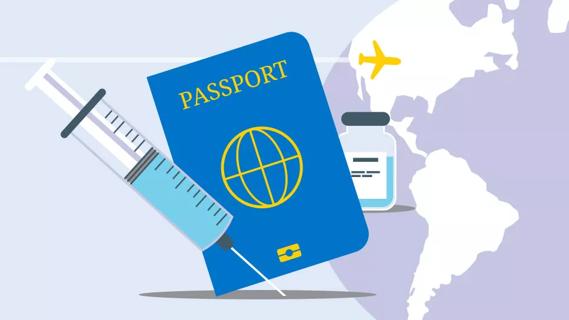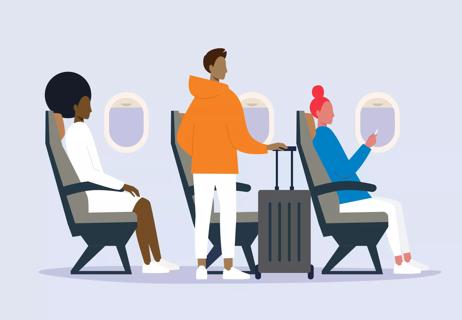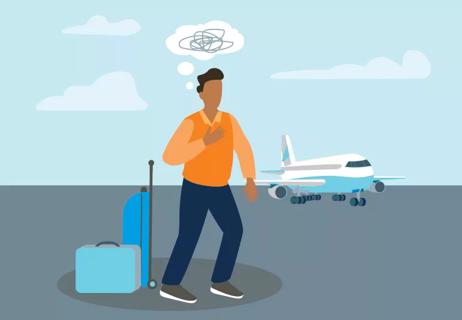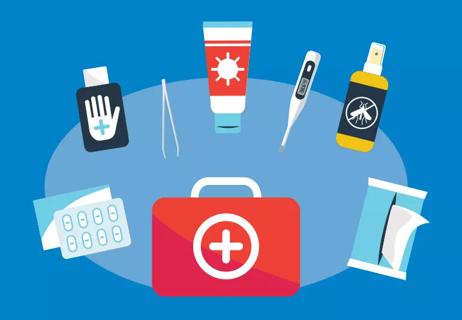Making a health plan with your doctor before you leave will make it easier to sit back and enjoy your flight

Air travel can be uncomfortable — and for some of us, scary — even under the best of circumstances. It can be even more intimidating when you’re living with (or recovering from) heart disease.
Advertisement
Cleveland Clinic is a non-profit academic medical center. Advertising on our site helps support our mission. We do not endorse non-Cleveland Clinic products or services. Policy
But cardiologist Kenneth Mayuga, MD, says it doesn’t have to be that way. Dr. Mayuga shares what you should know — and what plans to make — before flying.
Sitting on a plane 30,000 feet above the ground affects your body in many ways. What that means for your heart depends on the conditions you have and how they’re treated. Dr. Mayuga says it’s important to ask your healthcare provider about the risks of flying with your specific condition.
Air travel can affect your heart because of the:
Advertisement
If you’re recovering from a heart attack (myocardial infarction) or heart surgery, flying could impact your recovery by placing unnecessary stress on your heart. According to a 2017 review and research published by the British Cardiovascular Society, common heart conditions that can be impacted by air travel include:
Air travel can also affect you if you have a pacemaker, an implantable cardioverter-defibrillator (ICD) or a ventricular assist device (VAD). Also, speak to your provider before flying if you’ve had a procedure called a cardiac ablation.
When it comes to flying with a heart condition, preparation is everything. Here are some steps Dr. Mayuga recommends taking before you hit the runway.
Check in with your healthcare provider if you’re planning a trip. It’s extra important that they give you a once-over if you have new or worsening symptoms. Also, follow up if you’re recovering from a recent heart attack, a stroke or heart surgery.
Your provider will help you determine if flying is safe and what, if any, precautions you may need to take. In some cases, you may be asked to do a stress test to ensure your heart is up for the trip. You may also be prescribed certain medications in advance of flying.
“It’s important that your heart-related medical information travels with you wherever you go,” Dr. Mayuga says. He recommends keeping the following information handy in case of emergencies:
If you need to take heart medication while traveling, make sure you have enough to last the whole trip. If possible, pack a few extra days’ worth in case of unexpected delays.
And remember: Always keep medications in your carry-on luggage in the original bottle. You don’t want to risk losing it or having it confiscated by security. And if you’re traveling to another country, check to see if you need to complete a medical import application.
Advertisement
Do you have a pacemaker or an implanted cardiac defibrillator (ICD)? If so, Dr. Mayuga recommends that you:
If a handheld metal detector is needed, it shouldn’t be held over the pacemaker or ICD any longer than is absolutely necessary. If you’d prefer, you can also ask for a hand search (pat down) instead of the handheld metal detector.
If your provider told you that you’re at moderate risk for developing blood clots, compression socks or stockings are recommended. They can also be considered for use during longer flights. If you’re at high risk for developing blood clots, talk to your provider about their recommendations before flying.
Skip the salty snacks in favor of hydrating foods. And drink water — not alcohol — while you’re airborne. Alcoholic beverages will only worsen any dehydration that comes with flying. A nice bonus? Sticking with H2O and low-sodium snacks can also help prevent jet lag.
We get it: Nobody wants to be the reason the flight attendant’s looking for a doctor. And getting medical attention isn’t anybody’s idea of a vacation. But Dr. Mayuga stresses the importance of not ignoring symptoms when you have them. After all, your health is more important than your itinerary.
Advertisement
“Don’t be afraid to get checked for fear of spoiling your family vacation,” he urges. “Alert the crew if you have any chest pain, signs of a heart attack or other symptoms of heart disease while you’re in the air.”
And remember — the U.S. Federal Aviation Administration (FAA) requires passenger-carrying aircraft to have an automated external defibrillator on board. If you were to have an emergency on the plane, there are people trained to help you.
Having heart disease doesn’t mean your adventuring days are over. It just means you have to do some extra planning. If you can’t seem to check your worries at the departure gate, reach out to your provider. They can help you lay the groundwork for a safe and healthy flight.
Advertisement

Sign up for our Health Essentials emails for expert guidance on nutrition, fitness, sleep, skin care and more.
Learn more about our editorial process.
Advertisement

Among other benefits, a little time away can help make you more creative, decisive and focused

Setting realistic expectations and scheduling downtime can help reduce stress and make your time away more enjoyable

Dress baby in layers, gate-check your stroller and bring noise-canceling headphones

Plan early — getting the right vaccines can help you stay healthy on your travels

Flying can cause dehydration and bloating and make you feel tired and stressed

When the drive is familiar or monotonous, ‘procedural memory’ can take the wheel

Create a checklist, reflect on your needs and ask for help when unexpected delays occur

How to pack a well-stocked travel emergency kit

Even small moments of time outdoors can help reduce stress, boost mood and restore a sense of calm

A correct prescription helps your eyes see clearly — but as natural changes occur, you may need stronger or different eyeglasses

Both are medical emergencies, but they are very distinct events with different causes